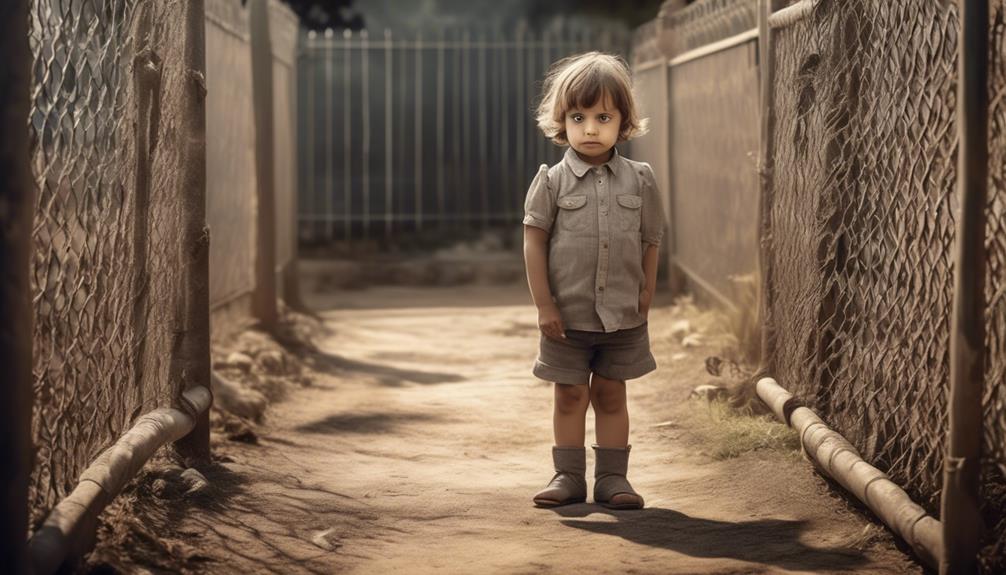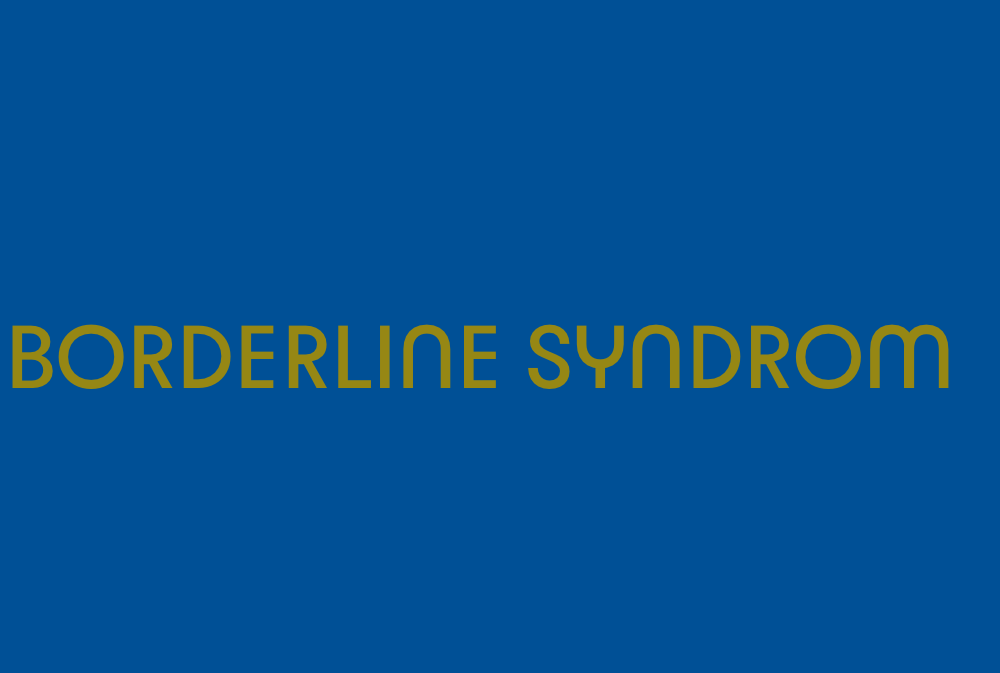Borderline Mother
Growing up with a Borderline Mother: My Story
A journey of emotional complexities and self-discovery awaits those who grew up with a Borderline Personality Disorder mother.

Estimates suggest that as many as 1.6% of American adults are affected by Borderline Personality Disorder (BPD). Growing up with a mother dealing with this disorder can deeply influence our emotional well-being and sense of self.
The journey of understanding and healing from the complexities of such a relationship is a deeply personal one that touches many aspects of our lives.
It's essential to explore how these experiences shape our perceptions, relationships, and overall mental health as we navigate the challenges of growing up with a borderline mother.
Key Takeaways
- Childhood trauma may affect emotional well-being in adulthood
- Establishing healthy boundaries with a Borderline Mother can be challenging
- Fear of abandonment can impact emotional well-being and future relationships
- Exposure to unpredictable emotional outbursts can affect relationships and mental health
Impact on Childhood Development
Growing up with a mother who's Borderline Personality Disorder (BPD) can profoundly impact a child's emotional and psychological development. Children of mothers with BPD often face significant challenges in forming secure attachments due to the emotional dysregulation and unpredictable behavior characteristic of the disorder. This can lead to emotional trauma and a sense of instability, affecting the child's ability to develop healthy boundaries and a strong sense of self.
Parenting challenges associated with BPD, such as intense emotional storms and difficulties in maintaining consistent emotional responses, can create an environment of chronic stress for the child. The lack of emotional stability and the presence of frequent emotional upheavals can contribute to low self-esteem and feelings of inadequacy in children. These experiences can result in childhood trauma that may have long-lasting effects on the child's emotional well-being and ability to navigate relationships in adulthood.
It is essential to recognize the impact of maternal BPD on children's development and provide appropriate support to mitigate the negative consequences of growing up in such an environment.
Emotional Turmoil and Unpredictable Behavior

Experiencing the emotional turmoil and unpredictable behavior of a mother with Borderline Personality Disorder can profoundly impact a child's emotional well-being and sense of stability. The intense mood swings and erratic actions of a mother with BPD create a turbulent environment for children, leaving them feeling wounded and ashamed. Children often face affection followed by rage, causing confusion and emotional distress. Establishing healthy boundaries becomes challenging as the unpredictable behavior of a mother with BPD blurs the lines of what is acceptable and safe. Growing up in such an environment presents endless obstacles, leading to painful wounds that can linger into adulthood.
| Emotional Turmoil | Unpredictable Behavior | Intense Mood Swings |
|---|---|---|
| Affection followed by rage | Challenging for children | Establish healthy boundaries |
| Painful wounds | Wounded and ashamed | Endless obstacles |
Coping With Intense Mood Swings
Coping with a mother's intense mood swings requires resilience, understanding, and self-care strategies to navigate the emotional challenges effectively. Children of mothers with BPD often find themselves on an emotional rollercoaster, experiencing extreme shifts from affection to rage. These unpredictable emotional storms can create a sense of confusion and emotional overwhelm, leaving children constantly on edge, fearing the triggering of sudden mood shifts and outbursts.
The fear of setting off these emotional avalanches can lead to a persistent state of anxiety and hypervigilance in children. The instability caused by a mother with BPD's intense mood swings can make it difficult for children to feel secure in their emotional environment, impacting their overall emotional well-being and stability.
Learning to cope with these intense mood swings is crucial for maintaining a sense of balance and emotional health in the face of ongoing turbulence. By developing strategies to manage the impact of their mother's fluctuating emotions, children can work towards creating a more stable and secure emotional landscape for themselves.
Navigating Fear of Abandonment

Children raised by mothers with Borderline Personality Disorder often grapple with a profound sense of insecurity stemming from their parent's inconsistent emotional presence and erratic behaviors. This upbringing can lead to a deep-seated fear of abandonment in children, impacting their emotional well-being and future relationships. Navigating the fear of abandonment in such circumstances is a complex process that requires careful attention and support.
Key Points:
- Impact of BPD: Children of mothers with BPD often develop a fear of abandonment due to the unpredictable nature of their parent's behaviors.
- Internalized Fear: Growing up with a borderline mother can instill a fear of rejection and abandonment in children, affecting their attachment style and trust in relationships.
- Emotional Turmoil: The constant emotional instability in the parent-child relationship exacerbates the fear of abandonment, leading to trust issues.
- Healing and Support: Overcoming the fear of abandonment necessitates emotional regulation, therapy, and rebuilding trust in relationships to navigate the lasting effects of childhood experiences.
Lasting Impact on Mental Health
Growing up with a borderline mother can have enduring effects on mental health, manifesting in challenges such as anxiety, depression, and low self-esteem.
Children of borderline mothers often struggle with emotional dysregulation, fear of abandonment, and forming healthy relationships due to exposure to unpredictable emotional outbursts and invalidating behaviors.
The chronic stress and trauma of this upbringing can significantly impact a child's sense of self-worth and emotional stability. Research indicates that these lasting effects can persist into adulthood, influencing various aspects of functioning and overall well-being.
Individuals who've experienced a borderline mother may find themselves grappling with personality disorders, maladaptive coping strategies, and difficulties in managing their emotions effectively.
It's essential to recognize the profound and lasting impact that growing up with a borderline mother can have on mental health and to seek appropriate support and interventions to address these challenges comprehensively.
Frequently Asked Questions
What Are Borderline Mothers Like?
Borderline mothers exhibit extreme mood swings and intense emotions. They struggle with regulating their feelings and may have a strong fear of abandonment, impacting their parenting style.
These mothers engage in impulsive behaviors and find it hard to set boundaries. This affects their children's stability.
Children of borderline mothers often grow up in a chaotic and emotionally tumultuous environment, which can impact their mental health and well-being.
How Do Borderline Mothers Treat Their Daughters?
Borderline mothers may treat their daughters with unpredictable emotional outbursts, leading to confusion and fear. They may struggle with setting healthy boundaries, impacting their daughters' sense of safety and security.
Manipulative behaviors may also be present, causing difficulties in trust and healthy relationships. Overall, daughters of borderline mothers may face challenges in forming a stable sense of self and dealing with low self-esteem due to the chaotic and unstable home environment.
What Happens to Children of BPD Mothers?
We experience disruptions in attachment and struggle with low self-esteem. Emotional storms and unclear boundaries are common challenges. Feelings of shame, wounds, and obstacles persist.
Trauma reactions like affection and rage leave deep emotional scars. Establishing healthy boundaries and seeking support are vital for us.
How to Cope With a Mother With Borderline Personality Disorder?
Setting clear boundaries and seeking professional support are crucial for coping with a mother who's Borderline Personality Disorder. Prioritizing self-care and understanding the impact of maternal BPD on our lives can aid in managing the challenges.
Learning healthy coping mechanisms and communication strategies is essential for improving our relationship with a mother with BPD. It's important to focus on our emotional well-being and seek help when needed to navigate this complex situation effectively.
Conclusion
In conclusion, growing up with a borderline mother can have a profound impact on childhood development. This impact can manifest in various ways, such as emotional turmoil, unpredictable behavior, coping with intense mood swings, and navigating fear of abandonment. These experiences can have lasting impacts on mental health.
It's essential to seek professional support and practice self-care to heal from the emotional wounds left by the relationship. Through resilience and perseverance, individuals who have grown up with a borderline mother can overcome the challenges they face and strive towards emotional well-being.
Isla’s writings reflect a profound connection to the BPD community, offering solace and understanding to those who feel isolated by their struggles. Her articles explore the nuances of relationships, healing, and self-discovery, all through the lens of BPD. Isla’s compassionate approach to storytelling encourages readers to embrace their journey with hope and resilience.
Borderline Mother
What Makes a Borderline Mother Unique?
Within the pages of 'The Borderline Mother,' witness the intricate web of maternal personas shaping lives – a journey that will captivate your curiosity.

Many individuals may find the captivating trends and dynamic images showcased in ‘The Borderline Mother’ intriguing.
Delving into the depths of maternal influence on children, this book dissects the dynamics of borderline personality disorder within the family unit.
As we navigate the nuanced narratives of the waif, the hermit, the queen, and the witch, an intricate web of challenges faced by offspring emerges.
Join us as we unravel the complexities, explore coping mechanisms, and uncover avenues for healing in the shadow of a borderline mother.
Key Takeaways
- Children raised by borderline mothers may experience insecurity and mistrust.
- Implementing self-care and emotional boundaries is crucial for mental well-being.
- Understanding signs of BPD in mothers can foster a stable family environment.
- Therapy offers tools for managing and healing from childhood trauma.
Impact on Children
Children raised by borderline mothers often struggle with feelings of insecurity and mistrust due to the perceived lack of love, negativity, and emotional unpredictability in their upbringing. Being exposed to a mother’s unloving, negative, and withholding behavior can deeply impact a child’s sense of self-worth and emotional well-being. The unpredictable nature of a borderline mother’s actions can leave children walking on eggshells, never knowing what to expect next. This constant state of alertness can hinder their ability to form healthy attachments and trust others.
The maternal influence in borderline relationships can contribute to the development of complex PTSD in children. They may experience higher stress levels, difficulties managing emotions, and challenges in forming secure relationships later in life. The dynamics within these relationships often prioritize the mother’s needs over the child’s, leading to a lack of validation and emotional support for the child’s experiences and feelings. As a result, children of borderline mothers may struggle with coping abilities and mental health issues, requiring specialized support to navigate the lasting impact of their upbringing.
Coping Strategies

Navigating life with a borderline mother often requires implementing coping strategies that prioritize self-care and emotional boundaries to safeguard one’s mental well-being. Setting boundaries with a borderline mother can be met with resistance and pushback, but it’s crucial for self-protection.
In some cases, cutting off contact becomes necessary to maintain personal boundaries and emotional health. Coping may also involve going along with false narratives or manipulation to shield oneself.
Seeking therapy, engaging in positive experiences, and building a strong support network are vital coping strategies for healing from the impact of a borderline mother. These actions not only provide emotional support but also help in developing healthy coping mechanisms.
It’s essential to prioritize personal boundaries and emotional well-being when dealing with a borderline mother, as this can significantly impact one’s mental health and overall quality of life.
Signs of BPD in Mothers
Exhibiting intense mood swings, impulsivity, and an unstable self-image, mothers with Borderline Personality Disorder (BPD) often display challenging behaviors that can significantly impact family dynamics. These mothers may struggle to maintain stable relationships, leading to conflicts and emotional turmoil within the family unit. Their behaviors, such as manipulation and control, are often driven by a need to fulfill their emotional needs, sometimes at the expense of their children’s well-being.
Children of mothers with BPD may experience chronic invalidation, emotional volatility, and unpredictable reactions, creating an environment of instability and insecurity. The signs of BPD in mothers can present as inconsistent parenting, extreme reactions to perceived abandonment, and difficulties in regulating emotions. These challenges can have lasting effects on the child’s emotional development and their ability to form healthy relationships in the future. Understanding these signs is crucial in providing support for both the mother with BPD and her children, fostering a more stable and nurturing family environment.
Healing From Childhood Trauma

Healing from childhood trauma caused by a borderline mother requires a commitment to setting boundaries and prioritizing self-care. Assertiveness and communication skills are crucial in establishing healthier relationships post-childhood trauma. Building a supportive network and seeking professional help can greatly aid in the healing process. Self-love and compassion play vital roles in overcoming the effects of being raised by a borderline mother. By practicing self-care and developing assertiveness, individuals can learn to prioritize their well-being and set healthy boundaries. Seeking professional help, such as therapy, can provide valuable tools for managing and healing from childhood trauma. Building a support system of understanding individuals is also essential for emotional recovery. Cultivating self-love and compassion is key to breaking free from the negative impacts of a borderline mother’s behavior and fostering a positive self-image.
Healing Strategies Importance Implementation Setting Boundaries Establishing healthier relationships Learn to say no when necessary Practicing Self-Care Prioritizing well-being Engage in activities that bring joy Seeking Professional Help Guidance and support Therapy or counseling sessions
Therapy Benefits
Exploring the benefits of therapy for individuals with borderline mothers sheds light on the transformative impact of professional guidance and emotional support. Therapy provides children of BPD mothers with a safe environment to process complex emotions and develop effective coping strategies. Dialectical Behavior Therapy (DBT) stands out as a valuable tool for both BPD mothers and their children, equipping them with skills to manage negative emotions and navigate challenging situations. Through therapy, children can enhance their resilience, improve mental well-being, and gain a deeper understanding of their experiences within the context of their mother’s condition.
Moreover, professional therapy aids children in constructing healthier relationship patterns and cultivating adaptive coping mechanisms. It supports BPD mothers in finding constructive ways to cope in the moment and establish positive behaviors that benefit both themselves and their children. This therapeutic journey contributes to the overall well-being of the family unit, fostering growth, understanding, and emotional healing.
Frequently Asked Questions
What Are Borderline Mothers Like?
Borderline mothers can be complex individuals, often exhibiting behaviors that can be confusing and hurtful. They may struggle with self-awareness and tend to seek validation through manipulating situations and people.
Understanding their actions can help navigate challenging relationships and set healthy boundaries. Their behaviors can have lasting effects on those around them, highlighting the importance of self-care and seeking support when dealing with such dynamics.
How Do Borderline Mothers Treat Their Daughters?
We understand the complexity of how borderline mothers treat their daughters. The emotional rollercoaster can be overwhelming, with love quickly turning to anger.
Invalidation of feelings and control over choices can create confusion and self-doubt. Daughters often feel pressured to prioritize their mother’s needs, neglecting their own well-being.
Boundaries may blur, leading to suffocating relationships. It’s vital to navigate these challenges with empathy and seek support for healing and growth.
What Is the Trauma of the Mother With Bpd?
The trauma of a mother with BPD can be profound, stemming from unresolved childhood issues and emotional dysregulation. Such mothers often struggle with intense fear of abandonment, leading to erratic behaviors and unstable relationships.
This trauma can manifest in impulsive actions, mood swings, and challenges in providing consistent caregiving. As a result, their ability to form secure attachments with their children can be compromised, perpetuating a cycle of relational difficulties and emotional distress.
How Do You Respond to a Borderline Mother?
When facing a borderline mother, we navigate with empathy and firm boundaries. It’s crucial to prioritize self-care and seek therapy for support.
Setting limits isn’t easy, but it’s necessary for our well-being. Understanding that her actions stem from a disorder helps us respond thoughtfully.
Conclusion
As we navigate the complexities of growing up with a borderline mother, it’s crucial to remember that we aren’t alone in our struggles. According to recent studies, over 6% of the population may have borderline personality disorder, highlighting the prevalence of this issue.
By seeking therapy, practicing self-care, and understanding the signs of BPD in mothers, we can begin to heal from childhood trauma and create a brighter future for ourselves. Remember, there’s hope and help available.
Isla’s writings reflect a profound connection to the BPD community, offering solace and understanding to those who feel isolated by their struggles. Her articles explore the nuances of relationships, healing, and self-discovery, all through the lens of BPD. Isla’s compassionate approach to storytelling encourages readers to embrace their journey with hope and resilience.
Borderline Mother
Understanding a Mother’s Borderline Personality Disorder
Leverage insight into the intricate dynamics of children with mothers who have Borderline Personality Disorder – a journey of discovery awaits.

Have you ever thought about the specific hardships that children face when their mothers have Borderline Personality Disorder?
The complexities of navigating life with a mother who has BPD can have profound impacts on a child’s emotional well-being and development.
Understanding these challenges is just the starting point; exploring strategies for support and healing can pave the way for a more empathetic and informed discussion on the topic.
Key Takeaways
- Emotional instability impacts parenting and relationships
- DBT therapy helps manage BPD symptoms effectively
- Support strategies enhance mother-child bonds and parenting practices
- Children of mothers with BPD may struggle with forming healthy attachments
Challenges Faced by Mothers With BPD
Mothers with Borderline Personality Disorder face significant challenges in navigating the complexities of parenting while managing their own emotional struggles. The emotional intensity and instability that are characteristic of BPD can impact a mother’s ability to provide consistent and nurturing care to her child. Children of mothers with BPD may experience neglect of their emotional needs, as these mothers may exhibit extreme control or aloofness in their parenting practices. The relationship dynamics between mothers with BPD and their children can be marked by unpredictability and instability, making it challenging for the child to feel secure and understood.
Due to these challenges, children raised by mothers with BPD may struggle to form healthy attachments and develop a strong sense of self. The emotional turbulence that often accompanies BPD can create a volatile environment for the child, influencing their emotional well-being and overall development. It’s crucial for mothers with BPD to seek support and therapy to better navigate their parenting journey and enhance their relationship with their child.
Impact on Parenting and Relationships

Navigating the challenges imposed by Borderline Personality Disorder, especially in the realm of parenting and relationships, demands a delicate balance of understanding and support. Mothers with Borderline Personality Disorder (BPD) may inadvertently subject their children to neglect, emotional instability, and inconsistent nurturing. Such behaviors can lead to attachment issues and difficulties in forming healthy connections in the children.
Relationships with a mother suffering from BPD are often characterized by intense emotional turmoil, invalidation, and unpredictability. Setting appropriate boundaries can be a struggle for these mothers, resulting in enmeshed or chaotic relationships with their children. The impact of a mother with BPD on parenting and relationships can manifest in trust issues, emotional instability, and challenges in establishing secure attachments.
Children raised by mothers with BPD may internalize negative feelings, impacting their self-esteem and emotional well-being. Understanding these dynamics is crucial in providing proper support for both the mother and the children in such situations.
Strategies for Managing BPD Symptoms
In addressing the challenges presented by Borderline Personality Disorder, individuals can effectively manage symptoms through the implementation of Dialectical Behavior Therapy (DBT), a proven intervention known for enhancing emotional regulation and relationship skills. DBT offers a comprehensive approach to managing BPD symptoms by focusing on distress tolerance, emotion regulation, interpersonal effectiveness, and mindfulness. By learning these skills, individuals with BPD can develop healthier boundaries, improve their emotional awareness, and reduce impulsivity. Studies have shown that DBT can lead to significant improvements in BPD symptoms and overall quality of life. Below is a table outlining the key components of DBT:
Component Description Distress Tolerance Learning to tolerate and cope with intense emotions and distressing situations Emotion Regulation Developing strategies to manage and control strong emotions effectively Interpersonal Effectiveness Enhancing communication skills and building healthier relationships Mindfulness Cultivating present-moment awareness and acceptance of thoughts and feelings
Resources for Mothers With BPD

When seeking support and resources for individuals with Borderline Personality Disorder who are mothers, it’s essential to explore programs like the online DBT group sessions offered by Grouport. These sessions, conducted by qualified therapists, focus on enhancing self-awareness and emotional regulation in mothers with BPD.
Participants in the Grouport program have reported significant progress, with 70% noting improvements within just 8 weeks. The aim of Grouport’s online DBT skills group is to transform and renew optimism in mothers struggling with borderline personality disorder.
By providing resources and support tailored specifically to mothers with BPD, these sessions offer a safe and structured environment for therapy and growth.
- Online DBT group sessions by Grouport
- Conducted by qualified therapists
- Focus on self-awareness and emotional regulation
- 70% of participants report significant progress in 8 weeks
- Tailored resources and support for mothers with BPD
Supporting Mothers With BPD
Supporting mothers with Borderline Personality Disorder involves implementing interventions that focus on enhancing their parenting practices and relationships with their children. Mothers with BPD may struggle with emotional instability, affecting their parenting behaviors and the attachment with their children. Interventions targeting mother-child dyads are crucial to break the cycle of psychosocial vulnerability transmission. Understanding the impact of maternal BPD on child outcomes is essential for tailoring effective support strategies.
Intervention Description Attachment Therapy Helps mothers with BPD improve their parenting practices and strengthen their bond with their children. Psychoeducation Provides mothers with knowledge on effective parenting practices, enhancing their ability to support their child’s needs. Support Strategies Offers emotional and practical support to mothers with BPD, aiding in their management of parenting challenges. Interventions with Mother-Child Dyads Focuses on improving the relationship dynamics between mothers with BPD and their children for better outcomes.
Frequently Asked Questions
What Happens to Daughters of Borderline Mothers?
Daughters of borderline mothers face unique challenges. They may struggle with trust and attachment due to unpredictable behavior. Growing up in such an environment can impact coping skills, mental health, and relationships.
These daughters might develop complex PTSD, high stress levels, and emotional difficulties. The dynamics of this relationship can hinder healthy development and self-identity.
Establishing boundaries, self-care, and seeking support are crucial steps for healing and overcoming these effects.
What to Do if Your Mother Has Borderline Personality Disorder?
When dealing with a challenging relationship like this, it’s vital to seek support and educate ourselves. Setting boundaries is crucial, and understanding the dynamics at play helps us navigate with clarity and compassion.
Prioritizing self-care is key in maintaining emotional well-being. Joining support groups or therapy sessions tailored for this situation can provide valuable guidance. Approaching the situation with empathy and learning about BPD core features can foster understanding and connection.
What Is the Trauma of a Borderline Mother?
Experiencing the trauma of a borderline mother involves enduring deep emotional scars and instability. It can lead to unpredictable behavior, emotional neglect, and prioritizing the mother’s needs over one’s own.
This upbringing impacts coping abilities, mental health, and relationships in the long run. Trust, shame, guilt, and forming healthy attachments become challenging.
The trauma hinders healthy development, self-identity, and emotional well-being, affecting us profoundly.
Can Someone With BPD Be a Good Mom?
Absolutely, someone with BPD can indeed be a good mom. It’s essential to acknowledge that individuals with BPD possess the capacity for love, care, and nurturing just like anyone else.
With dedication, therapy, and support, a person with BPD can learn to manage their symptoms effectively and provide a stable, loving environment for their children.
It’s a journey that requires patience and understanding from both the individual and those around them.
Conclusion
In conclusion, navigating the challenges of being raised by a mother with Borderline Personality Disorder can be emotionally taxing. By understanding the impact of this disorder on parenting and relationships, and by implementing strategies for managing symptoms and seeking support, both children and mothers can work towards healing and growth.
It’s important to remember that with the right resources and support, families affected by BPD can find ways to foster healthy attachments and relationships.
Isla’s writings reflect a profound connection to the BPD community, offering solace and understanding to those who feel isolated by their struggles. Her articles explore the nuances of relationships, healing, and self-discovery, all through the lens of BPD. Isla’s compassionate approach to storytelling encourages readers to embrace their journey with hope and resilience.
Borderline Mother
Navigating Boundaries: Helping Children of Borderline Mother
Harnessing the power of self-discovery, Children of Borderline Mother embark on a transformative journey of healing and understanding.

Navigating the intricate world of personal relationships often involves coming face to face with the reverberations of our past. Being raised by a mother with Borderline Personality Disorder can deeply influence our emotional terrain in ways that may be unclear to us.
The journey of understanding and healing these wounds requires patience and courage, but the insights gained along the way can offer profound transformation in how we relate to ourselves and others. In exploring the intricate dynamics of this relationship, we uncover layers of resilience and vulnerability that shape our very core.
Key Takeaways
- Children struggle with regulating emotions due to borderline mother’s influence.
- Establishing boundaries is challenging in the unpredictable emotional environment.
- Understanding complex emotional dynamics and implementing coping strategies is crucial.
- Early intervention and support are vital in fostering resilience and emotional well-being.
Impact on Emotional Well-being
Children of borderline mothers often struggle with regulating their own emotions due to the unpredictable emotional storms they experience. Growing up in such an environment can have a profound impact on their emotional well-being, often leading to challenges like low self-esteem and difficulties in emotional regulation. These children may find it hard to identify and express their own emotions appropriately, as they’ve been exposed to intense and erratic emotional patterns from their mother.
Establishing boundaries can be particularly challenging for these individuals, given the blurred lines and inconsistent interactions they’ve experienced. The trauma of growing up with a borderline mother can leave lasting scars on their emotional health, affecting their ability to form healthy relationships and cope with stress. Healing from these wounds involves acknowledging the impact of the trauma, seeking support from trusted individuals or professionals, and learning to set boundaries that prioritize their emotional well-being. It’s a journey towards self-discovery and healing that requires resilience, self-compassion, and a commitment to personal growth.
Challenges With Establishing Boundaries

Struggling to establish boundaries can be a significant challenge for individuals who’ve grown up with a borderline mother, given the unpredictable emotional storms and inconsistent behaviors they’ve navigated. Children of mothers with BPD often find it daunting to set clear boundaries due to the ever-changing nature of their mother’s emotions and actions. As children, we may have experienced blurred lines between what’s acceptable and what’s not, making it hard to assert our needs and limits effectively.
In order to overcome these challenges, it’s crucial for children of mothers with BPD to learn the art of clear communication and assertiveness. By clearly expressing our boundaries and standing firm in upholding them, we can create a sense of safety and control in our relationships. Seeking therapy or joining support groups tailored for children of mothers with BPD can provide valuable tools and guidance in establishing and maintaining healthy boundaries. Through these avenues, we can navigate the complexities of setting boundaries with empathy and strength.
Navigating Chaotic Relationships
Navigating chaotic relationships with a borderline mother requires a deep understanding of the complex emotional dynamics at play. Children of borderline mothers often find themselves in a whirlwind of emotional turmoil, trying to make sense of the unpredictable behaviors exhibited. The constant shifts between affection and rage can leave children feeling confused and distressed, struggling to establish healthy boundaries. This toxic relationship dynamic can lead to role reversal, where children take on the responsibility of managing their mother’s emotions, further exacerbating their own emotional dysregulation.
Identifying these patterns of chaotic relationships is crucial for breaking the cycle and fostering a sense of security. Parenting behaviors in such environments can inadvertently reinforce the instability, making it essential to set clear boundaries despite the challenges. Understanding the impact of attachment issues stemming from the rollercoaster of emotions is key to navigating these turbulent waters. By recognizing these dynamics and implementing strategies for establishing healthy boundaries, children can begin to find stability amidst the chaos.
Managing Intense Emotional Highs and Lows

Entering a realm of emotional turmoil and instability, individuals raised by borderline mothers must develop coping strategies to manage the intense highs and lows inherent in their mother’s unpredictable behavior. Identifying the emotional highs and lows is crucial for understanding the impact of the borderline mother’s erratic moods on the child’s emotional well-being. Parenting behaviors characterized by extreme emotional shifts can create a sense of instability and confusion for the child, necessitating the need for coping strategies.
Key Points to Consider:
- Establishing Boundaries: Setting clear boundaries is essential for protecting oneself from the emotional rollercoaster created by the borderline mother’s behavior.
- Building Support Systems: Seeking support from friends, family, or a therapist can provide a safe space for processing emotions and gaining perspective on managing the intense highs and lows.
- Developing Emotional Resilience: Learning coping strategies like hypervigilance and sensitivity to emotional cues can help children adapt and navigate the unpredictable environment, promoting stability and emotional well-being.
Insights and Support for Coping
In the journey of coping with the challenges of being raised by mothers with Borderline Personality Disorder (BPD), gaining insights and seeking support can significantly impact emotional well-being and resilience.
Identifying the effects of maternal BPD on children, such as disruptive behavior disorders and the development of psychopathology, is crucial in understanding the risks they face. Research shows that parenting behaviors of mothers with BPD can lead to disorganized attachment styles in children, emphasizing the need for intervention.
Dialectical behavior therapy (DBT) has shown promise in helping individuals with BPD manage their symptoms, which could positively influence parenting challenges. By recognizing potential targets for intervention early on, such as addressing intrusiveness and insensitivity, children’s long-term emotional well-being may be safeguarded.
Supporting children of mothers with BPD through understanding their experiences and providing resources for coping with the unique challenges they face can foster resilience and promote healthier outcomes.
Frequently Asked Questions
What Happens to Children of Borderline Mothers?
When children have borderline mothers, they face significant challenges. These children may encounter disruptions in attachment, struggle with low self-esteem, and find it hard to set healthy boundaries.
Emotional storms and unpredictable behavior can leave lasting scars. Healing from these wounds requires complex work, as the impact of maternal borderline personality disorder can deeply affect emotional well-being.
Understanding these difficulties is crucial in providing the necessary support and resources for healing.
What Does a Borderline Mother Act Like?
A borderline mother can exhibit extreme mood swings, from intense affection to sudden rage, causing emotional turmoil for her children.
She may struggle with impulsivity, leading to unpredictable decisions and behaviors.
Difficulty in establishing and maintaining boundaries can result in blurred lines between her needs and her children’s needs.
This can create chronic feelings of insecurity and fear for her children, impacting their sense of self-worth and emotional well-being.
Is BPD Inherited From Mother or Father?
BPD can be inherited from either parent due to genetic factors. Research indicates a strong genetic component to BPD, making it possible for the disorder to be passed down from the mother or the father.
Family history plays a significant role in the risk of developing BPD, regardless of the parent from whom it’s inherited. Genetic predispositions and environmental influences contribute to the inheritance of BPD traits, with both parents potentially passing down such traits.
Can Someone With BPD Be a Good Mom?
We believe that someone with BPD can be a good mom with the right support and treatment. By seeking therapy, developing coping mechanisms, and setting healthy boundaries, a mother with BPD can provide a stable and nurturing environment for her children.
For instance, Sarah, a mother with BPD, underwent dialectical behavior therapy and learned to regulate her emotions, resulting in a more consistent and loving parenting style. It’s about dedication and growth.
Conclusion
As children of borderline mothers, we face unique challenges that impact our emotional well-being, ability to establish boundaries, and navigate relationships.
One interesting statistic to consider is that studies show that up to 70% of individuals diagnosed with Borderline Personality Disorder have a history of childhood trauma. This statistic highlights the importance of seeking support, therapy, and self-care practices to heal from the wounds of growing up with a mother struggling with BPD.
Remember, you aren’t alone in this journey.
Isla’s writings reflect a profound connection to the BPD community, offering solace and understanding to those who feel isolated by their struggles. Her articles explore the nuances of relationships, healing, and self-discovery, all through the lens of BPD. Isla’s compassionate approach to storytelling encourages readers to embrace their journey with hope and resilience.
-

 Divorcing a Partner with Borderline6 days ago
Divorcing a Partner with Borderline6 days agoUnderstanding Borderline Personality in Divorce
-

 Borderline Personality1 week ago
Borderline Personality1 week agoStories of Hope: Triumph in BPD Relationships
-

 Managing or Understanding BPD3 days ago
Managing or Understanding BPD3 days agoHow Does a Borderline React to No Contact
-

 Managing or Understanding BPD3 days ago
Managing or Understanding BPD3 days agoHow to Communicate With Someone Who Has Borderline Personality Disorder
-

 Divorcing a Partner with Borderline4 days ago
Divorcing a Partner with Borderline4 days agoHow to Navigate Divorce with a Borderline Personality Disordered Spouse
-

 Borderline Narcissist3 days ago
Borderline Narcissist3 days agoNarcissist Vs Borderline: Key Differences in Personality Disorders
-

 Borderline Disorder3 months ago
Borderline Disorder3 months agoHealing After a Bpd Relationship: Recovering Your Self
-

 Borderline Disorder3 months ago
Borderline Disorder3 months agoWhat Characters in TV Show Have Bpd?

















